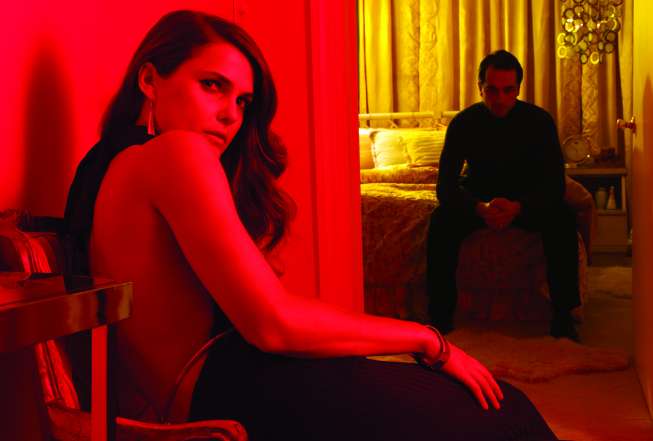The Year in Television: 2015
As alternative platforms ascend, let's look at the best of what 'traditional' networks offered.


As Sherlock Holmes might have said if he were a network suit, the most significant TV development of 2015 was not a new show or genre, but the curious case of the dog that didn't get canceled. In recent years, by the first week of October, the Hollywood decks were already running red with blood of prime-time corpses.
Surely you (don't) remember Head Cases (Chris O'Donnell and Adam Goldberg as lawyers who partner up while doing time in a psychiatric hospital), gone after two episodes in 2005? Or The Beautiful Life: TBL, an Ashton Kutcher-produced ode to slutty young cokehead models, two episodes in 2009? Or Lone Star, with James Wolk as a Texas oilman with two wives, coincidentally also the number of the show's viewers and the number of episodes it would last in 2010?
This fall, however, prime-time TV has something close to a demilitarized zone. By mid-December, only two shows had been cancelled: Best Time Ever with Neil Patrick Harris, NBC's "What were they thinking?" attempt to revive the long-dead variety show, and Wicked City, a creepily intense ABC cops-and-serial-killer that ran afoul of a new-found and doubtless short-lived critical burst of conscience over drama that depicts violence against women.
The shortage of quickie cancellations is not a signal that the 2015-16 TV season was a creative or financial bonanza. Actually, it was quite the opposite, without a single breakout hit among either audiences or critics.
Rather, the networks' live-and-let-live policy is a recognition of technological changes that are shaking the industry. For one thing, the nets now have so many platforms to feed—cable subsidiaries, digital sub-channels, their own streaming sites—that it no longer makes financial sense to quickly cancel a show and lose the substantial start-up investment. Instead, the networks reduce the number of episodes they've ordered (typically 13) by a third and count on repurposing to cut their losses. Several low-rated fall shows that would undoubtedly have been canceled in years past—some idiotic, like NBC's The Player and Truth Be Told; others, like ABC's Blood & Oil or Fox's Minority Report, the victims of bad marketing or even bad luck—instead got the trimmed-episode treatment.
More fundamentally, in the age of the DVR, overnight Nielsen ratings have lost their ability to define winners and losers. A show can be a real-time flop and a time-shifted hit; the average ratings of Fox's slasher satire Scream Queens grew 53 percent over the three days after each episode aired.
Yet that's not really good news for the television industry, at least in its current configuration, since nearly all those DVR viewers zap right past the commercials. That makes streaming services like Hulu, with their subscription fees and embedded commercials (that, though limited, cannot be zapped) increasingly important. And as the gaps between the screening of network shows and their release to streaming sites shrinks, cord-cutting has turned from a scary story TV executives tell themselves around the campfire to a measurable and accelerating phenomenon, with five million households departing the cable universe this year.
Where this all ends, nobody really knows. Will the networks leave their broadcast model behind, abandoning their local affiliates to the sort of cheapjack programming—local ladies' coffee klatches and old movies—that made up most of the TV day in the 1950s? Will the ranks of cable networks dwindle to a few news and live-sports channels, the only forms of programming that seem immune to time-shifting? Good questions all.
But meanwhile, even in a mediocre season and facing an uncertain future, TV continues in a programming Golden Age refutation of Bruce Springsteen's infamous whine about 57 channels and nothin' on. Here are my choices for the year's best:
10. (tie) The Big Bang Theory (CBS) and Aquarius (NBC). A seeming one-trick pony about the (admittedly hilarious) social dysfunction of a group of Cal Tech faculty nerds, Big Bang Theory has evolved into a show about growing up as its characters slowly but surely find their way in a world that's suspicious of their intellect and scornful of their Star Wars no-tears shampoo. About as far as you can go to the opposite end of the spectrum, Aquarius—a police procedural in which the target is the first nascent incarnation of the Manson Family—is a useful and chilling reminder of the totalitarian impulses at the heart of the 1960s counterculture.
9. Episodes (Showtime). This sitcom about a pair of Serious Writers from the BBC whose show is hijacked by American television is TV's most scathingly funny self-examination ever. And with Matt LeBlanc playing a loutish version of himself, Episodes regularly does the unthinkable: trashes the iconography of Friends.
8. The Spymasters—CIA in The Crosshairs (Showtime). A journalistic coup in which a dozen former CIA directors sat down for anything-but-softball questions about the agency's conduct of the war on terror, the documentary Spymasters is among the most searching and non-dogmatic examinations yet of the post-9/11 national security state.
7. Penny Dreadful (Showtime). An extraordinarily entertaining mash-up of the Goth legends of the waning days of Victorian England, this series has every blood-sucking, fang-growing, evil-spawning character you can think—a kind of Frankenstein Meets the Wolf Man for the literate.
6. The Good Wife (CBS). What started as a brittle portrait of a Hillary Clinton-style political wife forced to reinvent her life after her husband goes to prison in a hookers-for-favors scandal has grown into a startlingly acute disquisition on the insidious, one-step-at-a-time nature of political corruption and how it colors every governmental institution.
5. Better Call Saul (AMC). The conventional and usually correct wisdom that sequels (or, in this case, prequels) are the most contemptibly parasitic form of Hollywood life is getting a serious challenge from this origins drama about Saul Goodman, the ubersleaze lawyer in AMC's drug-kingpin drama Breaking Bad. In Breaking Bad, Goodman—played by comedian Bob Odenkirk—was a comic-relief bit player. In Better Call Saul, the laughs are still there, but hazed in a mist of pathos as a hustler trying to remake his life learns that the law game isn't so different from the three-card monte he played on street corners.
4. Public Morals (TNT). Producer-star Ed Burns' now-canceled look at the seamy, violent and enticing world of the NYPD vice squad in the 1960s, where policing is really a leviathan extortion racket in which the cops extract money, sexual favors and political clout from favored gamblers and hookers while administering broken noses and jail time to the rest.
3. Hell On Wheels (AMC) It launches its sixth and final season in early 2016, but there's still time to catch up with this transfixing tale of the construction of America's intercontinental railroad, a caustic look at the intersection of political power and corporate greed that also probes the issues of race, class and gender.
2. The Americans (FX) and 1. Homeland (Showtime). If this is the Golden Age of television, it's the Platinum Age of television spy dramas. These two shows offer very different, but equally compelling, looks at espionage without any of the James Bond glamor trappings.
The Americans stars Keri Russell and Matthew Rhys as deep-cover Soviet moles, living in in the 'burbs of Reagan American with a couple of kids who have no idea that mom and dad's Founding Fathers are not Washington and Jefferson but Lenin and Stalin. The plots are interesting reboots of such 1980s hits as Star Wars weaponry and Afghanistan, but the emotional meat of the series is its examination of the fierce—and dangerous—domestic fault lines cracked open by undercover life.
Homeland is more producer Howard Gordon's apologia for the 9/11 revenge porn of his show 24. Taking a step back, he brilliantly cast Claire Danes as a bipolar CIA officer whose paranoia about al Qaeda moles could be dazzling intelligence work, or literal lunacy. The show's constant we-know-they-know-we-know ruminations capture the chess-like nature of counterintelligence in a way that bang-bang-obsessed Hollywood has rarely managed. Homeland's sobering genius is that it is fraught in equal measure with both security-state excesses and jihadi barbarism. And the most sobering element of all is that after five seasons, Homeland still has a clarion resonance that shows no sign of dimming.


Show Comments (21)